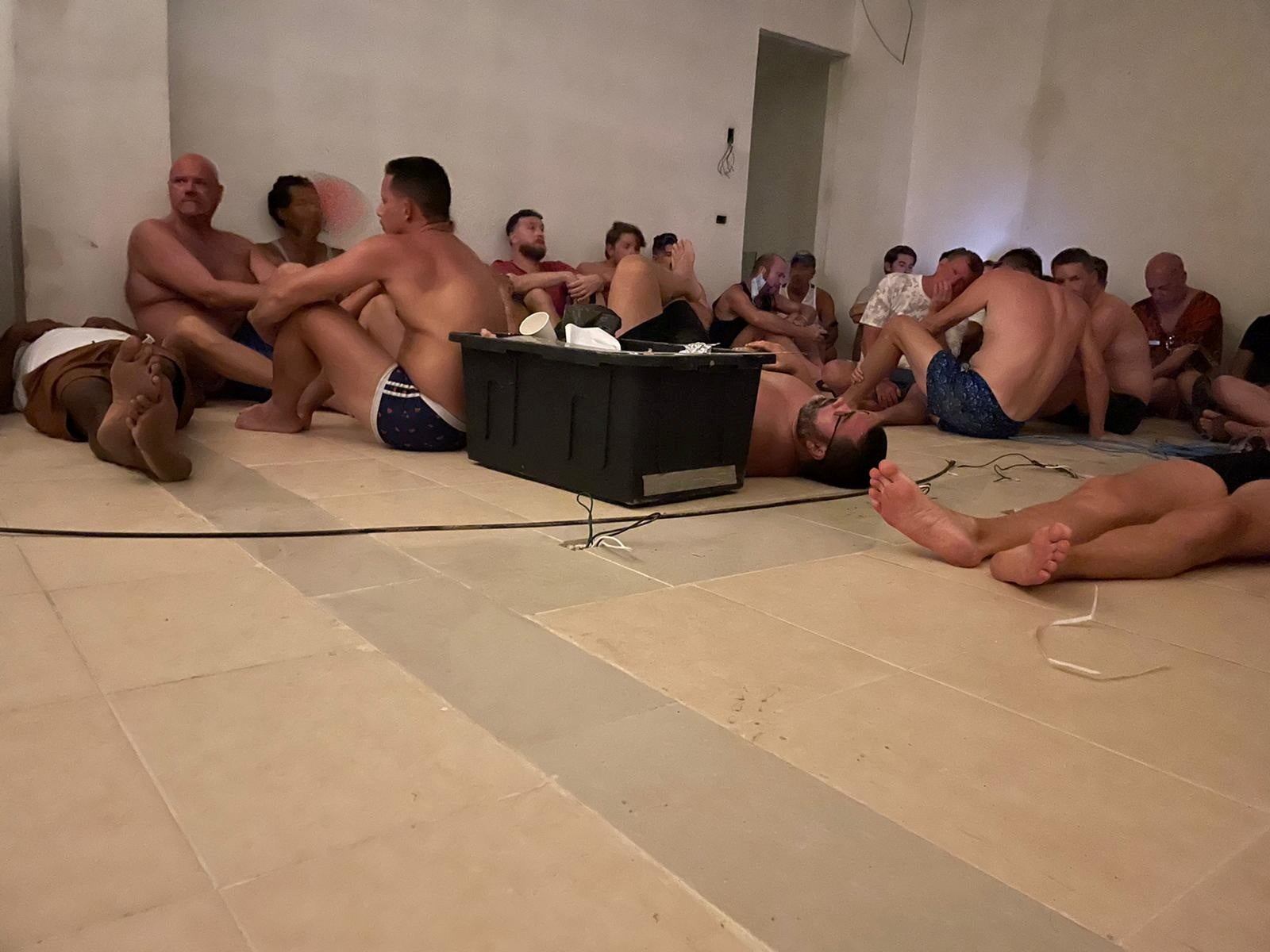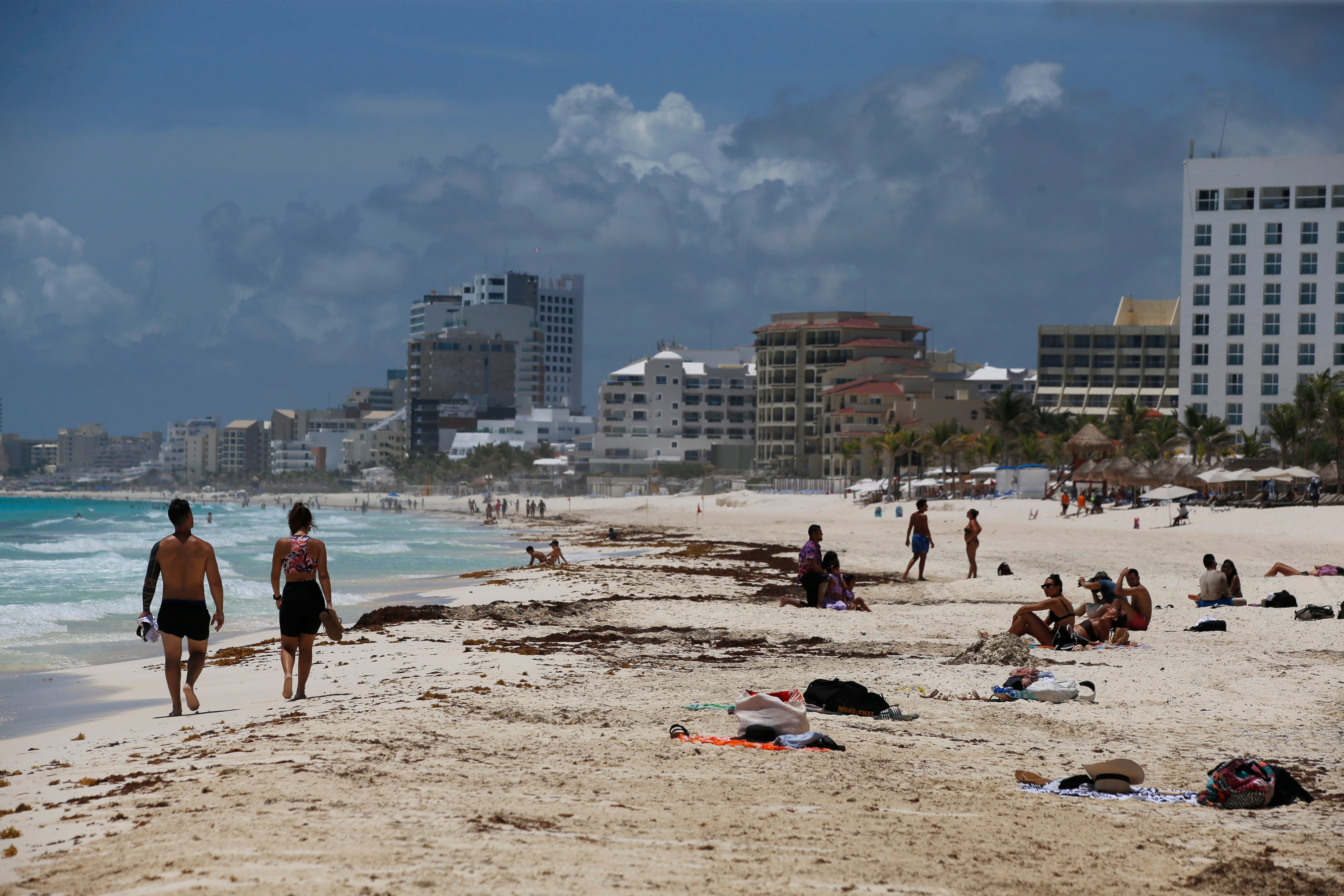‘We are all guilty’: How the tourist haven of Mexico’s Caribbean coast became a battleground for drug gangs
The dramatic shooting on a beach in Cancún is only the latest in a series of violent gang murders that have rattled authorities in the traditionally safe province of Quintana Roo
Your support helps us to tell the story
From reproductive rights to climate change to Big Tech, The Independent is on the ground when the story is developing. Whether it's investigating the financials of Elon Musk's pro-Trump PAC or producing our latest documentary, 'The A Word', which shines a light on the American women fighting for reproductive rights, we know how important it is to parse out the facts from the messaging.
At such a critical moment in US history, we need reporters on the ground. Your donation allows us to keep sending journalists to speak to both sides of the story.
The Independent is trusted by Americans across the entire political spectrum. And unlike many other quality news outlets, we choose not to lock Americans out of our reporting and analysis with paywalls. We believe quality journalism should be available to everyone, paid for by those who can afford it.
Your support makes all the difference.At its idyllic height in Hollywood’s golden age, the Mexican resort town of Acapulco hosted John Wayne’s holidays, Elizabeth Taylor’s wedding and Errol Flynn’s luxury yacht.
But by 2012 it had become the deadliest city in Mexico – a title that it held for the next five years as powerful drug cartels and neighbourhood gangs struggled violently for control.
That is the fate that could await Cancún and the rest of Mexico’s Caribbean coast if Thursday’s beachfront shoot-out between rival drug dealers becomes a routine occurrence.
Four American tourists were injured and two alleged dealers shot dead when armed gangsters arrived to “execute” their rivals, right in front of a five star luxury resort where roughly 750 LGBTQ travellers were on a group trip.
Only two weeks earlier, on 20 October, a Californian travel blogger and a German tourist were killed in a similar crossfire between street-level crooks in nearby Tulum, where president Andrés Manuel López Obrador’s hopes of supercharging the tourist economy are now under threat.
“I hope, hope, hope it doesn’t have the same effect here,” said Dan Howell, a travel agent in Cincinnati, Ohio who was among the travellers forced to take shelter at the Hyatt Ziva Riviera Cancún hotel when shooting broke out.

He too used to travel to Acapulco in the Nineties, but says drug violence has “pretty much killed off” tourism there now.
“I’ve been selling this area for 25 years, I bring my family down here every year, and part of that is we’ve always felt very safe here,” he said. “It’s pretty much escaped the violence of other parts of Mexico.
“In this area, there is no other industry – tourism is how these lovely people make their living. They’ve been through Covid and they’ve been hurting, and they depend on gratuities and tips. I can’t see how it doesn’t hurt tourism.”
A ‘sleepy fishing village’ caught in a crime surge
Mr Howell said he was particularly shocked because the incident happened near Puerto Morelos, a “sleepy little fishing village” more than 30 minutes’ drive from either Cancún or Playa del Carmen that attracts sunbathers looking for a quieter experience.
Guests did not initially know what was happening and some worried that it was a mass shooting or a deliberate attack on LGBTQ people. Quintana Roo governor Carlos Joaquín González initially said the gunmen had arrived by boat, echoing the 2008 Mumbai terror attacks, but another official said they came by land in vehicles.
The US State Department has been warning since at least 2018 that travellers should “exercise increased caution” when visiting Quintana Roo, the province on Mexico’s Yucatán Peninsula that hosts Cancún, Tulum and Playa del Carmen.
“While most of these homicides appeared to be targeted, turf battles between criminal groups have resulted in violent crime in areas frequented by US citizens. Shooting incidents injuring or killing bystanders have occurred,” the Department said.
The province has already seen 1,000 murders this year, according to official data, and eight out of 10 residents told a government survey that they feel unsafe. Poor security topped the list of issues they are worried about, far exceeding unemployment or access to medical care.

The same survey suggests that crime cost Quintana Roo more than 7.4 billion pesos ($364m) in 2020, a 43 per cent increase from the previous year.
“It’s certainly what you would consider a brand damaging event,” said Brad Bonnell, a veteran hotel executive who frequently worked in Mexico during his 18 years as global head of security for Intercontinental Hotels Group (IHG), which owns the Holiday Inn and Crowne Plaza chains.
In 2011, Mr Bonnell was dispatched to Mexico following the horrific Monterrey casino attack, in which members of the Zetas drug syndicate stormed a casino and set it alight, killing 52 people (including a young sales IHG sales director).
“I’m sure there are some people cancelling reservations,” he said of this week’s killings.
Indeed, Keith Jackson, a Londoner who left left the beach just before the shooting, said on Friday: “We’re not sure we would come back. We’re not sure we would come back after this.”
Tourism fuelling rising demand for drugs
Even the deadly gunfight in Tulum last month was only the latest of several incidents. A taxi driver and a security guard were shot dead there in September, while another man died after being shot in the neck in August.
The same week the tourists were killed, a man was found dead and bound in a park in Cancún. And in Playa del Carmen, police recently arrested 26 people in a series of raids sparked by the murder of a police officer, who was found locked in a car boot.
Prosecutors said crime had increased due to “extortion [and] drug sales to foreigners and Mexicans.”
“In Tulum we have about 10 groups of drug dealers and here in Puerto Morelos there are two groups fighting each other,” prosecutor Oscar Montes de Oca told the Imagen Radio station on Friday.
He said the 20 million tourists that visit Quintana Roo each year are driving a strong demand for drugs that is fuelling the violence, with the Jalisco cartel and an affiliate of the Gulf cartel both in play. Thursday’s battle was reportedly sparked by the victims claiming lucrative drug sales territory on the Puerto Morelos beach.
Politicians are taking notice. Claudia Anaya, a former Mexican senator, described Thursday’s chaos as a “horror movie”, asking: “Do you think tourists want to keep coming to share our tragedy?”
At the centre of it is Governor González, who reportedly took six hours to comment on the attack. When he did, he called it “a serious blow to the development and security of the state ... putting the image of the state at grave risk”.
Only on Tuesday, Mr González had given a speech expressing contrition for not stopping the deaths in Tulum. “Today we have more than 500 security officers in Tulum, but it took such an event for us to reach those numbers,” he said.
“We are all guilty, all of us share the responsibility, and that is why the challenge is to recover the image of a safe and successful destination.”
He added: “That very morning, the national Secretariat of Security reported that Quintana Roo was one of the three states that had most decreased their crime rates. It’s ironic, right? But that’s how it is.”
Mexico pins its hopes to the ‘Mayan Riviera’
The stakes are high given Mr López Obrador’s plans for the so-called “Mayan Riviera”, named for its proximity to Mayan ruins such as Chichen Itza. Apart from the Tulum airport, an intercity rail loop around the whole Yucatán Peninsula is under construction.
Yet that is exactly why Mr Bonnell believes Quintana Roo can avoid the fate of Acapulco. “The Mexican government goes to great lengths to protect that resort area,” he said. “They built it, and it generates an extraordinary amount of revenue for the republic.”
He described the harm to foreign tourists as an “isolated incident”, saying: “The cartels, the criminals, the kidnappers, do not like to mess with Americans. There’s very little profit in it and it attracts a kind of attention they don’t want.
“Their target, primarily, is going to be their own competition ... I would say that gringos have nothing to fear.”
Jim Berkeley, head of the travel agency Destinations and Adventures International, agreed, saying: “I don’t think you’re going to be seeing a drug gang fight out on the beach front of a Hyatt hotel in Cancún very often.”
Vacaya, the LGBTQ travel agency that organised the Hyatt trip, was keen to stress the “resilience” of guests and staff, providing video of an American tourist who was wounded in the fight returning “triumphantly” from hospital to the resort.
For his part, Mr Howell said that government forces responded “instantaneously” to the shooting, rapidly putting helicopters in the air and blanketing the Hyatt resort with armed troops.
By the time he spoke to The Independent on Friday, things were very much back to normal: Vacaya guests were gathered around the pool, cheering as they judged contestants in a high heel walking contest.
Join our commenting forum
Join thought-provoking conversations, follow other Independent readers and see their replies
Comments